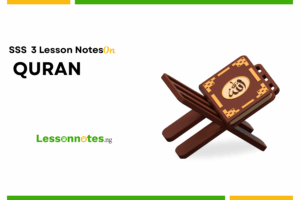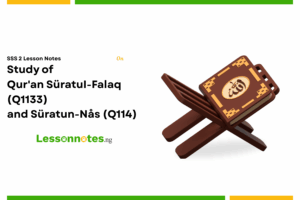Talaq – (Divorce) SS2 Islamic Studies Lesson Note
Download Lesson NoteTopic: Talaq – (Divorce)
Marriage in Islam is a sacred bond and a strong contract between a man and a woman. It is meant to bring peace, love, and mercy between spouses. However, Islam recognizes that sometimes marriages face problems that cannot be solved. In such cases, Islam allows divorce as a last option. This lesson explains the concept of Talaq (divorce) in Islam, its types, and other ways a marriage can end.
-
Meaning of Talaq
Talaq is an Arabic word that means “to release” or “to free.” In Islamic law, Talaq refers to the dissolution of a marriage by the husband using specific words. When a husband pronounces Talaq, he is releasing his wife from the marriage bond.
Islam considers divorce as an allowed but disliked action. The Prophet Muhammad (peace be upon him) said: “Among the lawful things, divorce is the most disliked by Allah.” This shows that Muslims should try their best to save their marriage before thinking about divorce.
Before deciding to divorce, Islam encourages couples to:
- Talk about their problems openly
- Seek help from family members
- Consult marriage counselors
- Be patient and forgiving
- Remember Allah and pray for guidance
Divorce should only be the last option when all efforts to save the marriage have failed.
Types of Talaq
There are two main types of Talaq in Islamic law: Talaq Raj’i (revocable divorce) and Talaq Ba’in (irrevocable divorce).
- Talaq Raj’i (Revocable Divorce)
Talaq Raj’i is a type of divorce where the husband can take his wife back during the waiting period (Iddah) without a new marriage contract or dowry. The main features of Talaq Raj’i are:
– It happens when the husband pronounces Talaq once or twice to his wife
– The husband can return to his wife during her waiting period by words or actions
– If the waiting period ends without reconciliation, the divorce becomes final
– The waiting period (Iddah) is three menstrual cycles for women who menstruate, three months for those who do not, and until delivery for pregnant women
Talaq Raj’i gives couples a chance to think about their decision and possibly save their marriage. During the waiting period, the wife stays in the husband’s house, and he must provide for her needs.
- Talaq Ba’in (Irrevocable Divorce)
Talaq Ba’in is a type of divorce where the husband cannot take back his wife without a new marriage contract and dowry. Talaq Ba’in is further divided into two types:
a) Talaq Ba’in Sughra (Minor Irrevocable Divorce)
This occurs in the following situations:
– When the husband divorces his wife before consummation of marriage
– When divorce happens through Khul’ (wife seeking divorce)
– When the waiting period of Talaq Raj’i ends without reconciliation
In Talaq Ba’in Sughra, the couple can remarry with a new marriage contract and dowry if both agree.
b) Talaq Ba’in Kubra (Major Irrevocable Divorce)
This occurs when:
– The husband has pronounced Talaq three times (either in one sitting or on separate occasions)
– The triple Talaq completes the maximum number of divorces allowed
In Talaq Ba’in Kubra, the couple cannot remarry unless the woman marries another man genuinely, the marriage is consummated, and then that marriage ends naturally (through divorce or death) without any preplanning. This strict condition is meant to discourage hasty divorces.
III. Kinds of Marriage Cessation in Islam
Besides Talaq, there are other ways a marriage can end in Islam:
- Khul’ (Divorce Initiated by the Wife)
Khul’ is when a wife seeks to end the marriage by giving compensation to her husband. The main features of Khul’ are:
– The wife requests the divorce because she dislikes continuing the marriage
– She offers to return the dowry or give some other compensation
– The husband accepts the compensation and releases her from the marriage
– Khul’ counts as one irrevocable divorce
– The wife must observe the waiting period just like in Talaq
Khul’ is based on the Quranic principle that if a wife fears she cannot fulfill her duties toward her husband, she can seek release from the marriage. This shows Islam’s fairness by giving both spouses ways to end an unhappy marriage.
- Faskh (Annulment by a Judge)
Faskh is the annulment of a marriage by an Islamic judge (Qadi) due to valid reasons. The reasons for Faskh include:
– Serious defects found in either spouse that were unknown before marriage
– Harm or mistreatment by the husband
– The husband’s inability to provide financial support
– The husband’s absence for a long period without valid reason
– Serious incompatibility between spouses
– Violation of marriage contract conditions
Faskh differs from Talaq and Khul’ because it requires a judge’s decision. After Faskh, the couple can remarry with a new contract if they both agree and if the reason for annulment no longer exists.
- Mubarah (Mutual Divorce)
Mubarah happens when both husband and wife agree to end the marriage because both dislike continuing it. The key features of Mubarah are:
– Both spouses mutually agree to separate
– Neither spouse asks for compensation from the other
– It becomes effective immediately
– The wife must observe the waiting period
Mubarah is considered a more amicable way of ending the marriage since both parties want to separate.
Condemned Types of Talaq in Islam
While Islam allows divorce, certain forms are considered improper or even sinful:
- Talaq Al-Bid’ah (Innovative Divorce)
This refers to divorces that do not follow the proper Islamic method. Types of Talaq al-Bid’ah include:
a) Triple Talaq in One Sitting
This is when a husband pronounces divorce three times in one sitting or in one statement, such as saying “I divorce you, I divorce you, I divorce you” or “I divorce you three times.” This form is condemned because:
– It goes against the spirit of Islamic law, which encourages thoughtful consideration
– It removes the chance for reconciliation
– It closes the door for the couple to return to each other easily
Most scholars consider this form of divorce valid but sinful. The couple cannot remarry until the wife marries another man, and that marriage ends naturally.
b) Talaq During Menstruation
Divorcing a wife during her menstrual period is considered improper in Islam because:
– It may be motivated by temporary frustration rather than careful thought
– The waiting period will be prolonged, causing more hardship
– The husband might regret his decision when his wife’s condition changes
If such a divorce occurs, the husband should take back his wife and wait until she is pure from menstruation before deciding if he still wants to divorce.
2. Talaq Al-Mu’allaq (Suspended or Conditional Divorce)
This is when a husband makes the divorce dependent on a condition, such as saying, “If you visit your family, you are divorced.” This type is condemned because:
– It uses divorce as a threat or means of control
– It creates uncertainty in the marriage
– It trivializes the serious matter of divorce
- Talaq Al-Hazl (Joking Divorce)
This refers to pronouncing divorce as a joke. The Prophet Muhammad (peace be upon him) said: “Three matters are serious whether done seriously or in jest: marriage, divorce, and taking back a wife.”
Even if a man pronounces divorce jokingly, it may be considered valid by many scholars. This shows the seriousness with which Islam views the marriage contract.
The Wisdom Behind Islamic Divorce Laws
Islam’s divorce system shows great wisdom:
- It recognizes that some marriages cannot be saved and provides a way out
- It encourages reconciliation through the waiting period in revocable divorce
- It protects women’s rights by giving them the option of Khul’
- It discourages hasty divorces through the strict conditions of triple divorce
- It balances the needs of both spouses and considers the family’s welfare
- It aims to minimize harm when separation becomes necessary
Conclusion
Islam views marriage as a blessing and encourages spouses to make every effort to maintain a healthy relationship. However, it also recognizes that in some cases, divorce may be the better option. The different types of divorce in Islam provide flexibility while still protecting the rights of both spouses.
The Islamic system of divorce shows balance by making divorce available when needed but discouraging it when unnecessary. It emphasizes that divorce should be a last resort after all attempts at reconciliation have failed. By understanding these teachings, Muslims can approach marriage and divorce with wisdom, responsibility, and adherence to Islamic principles.






















